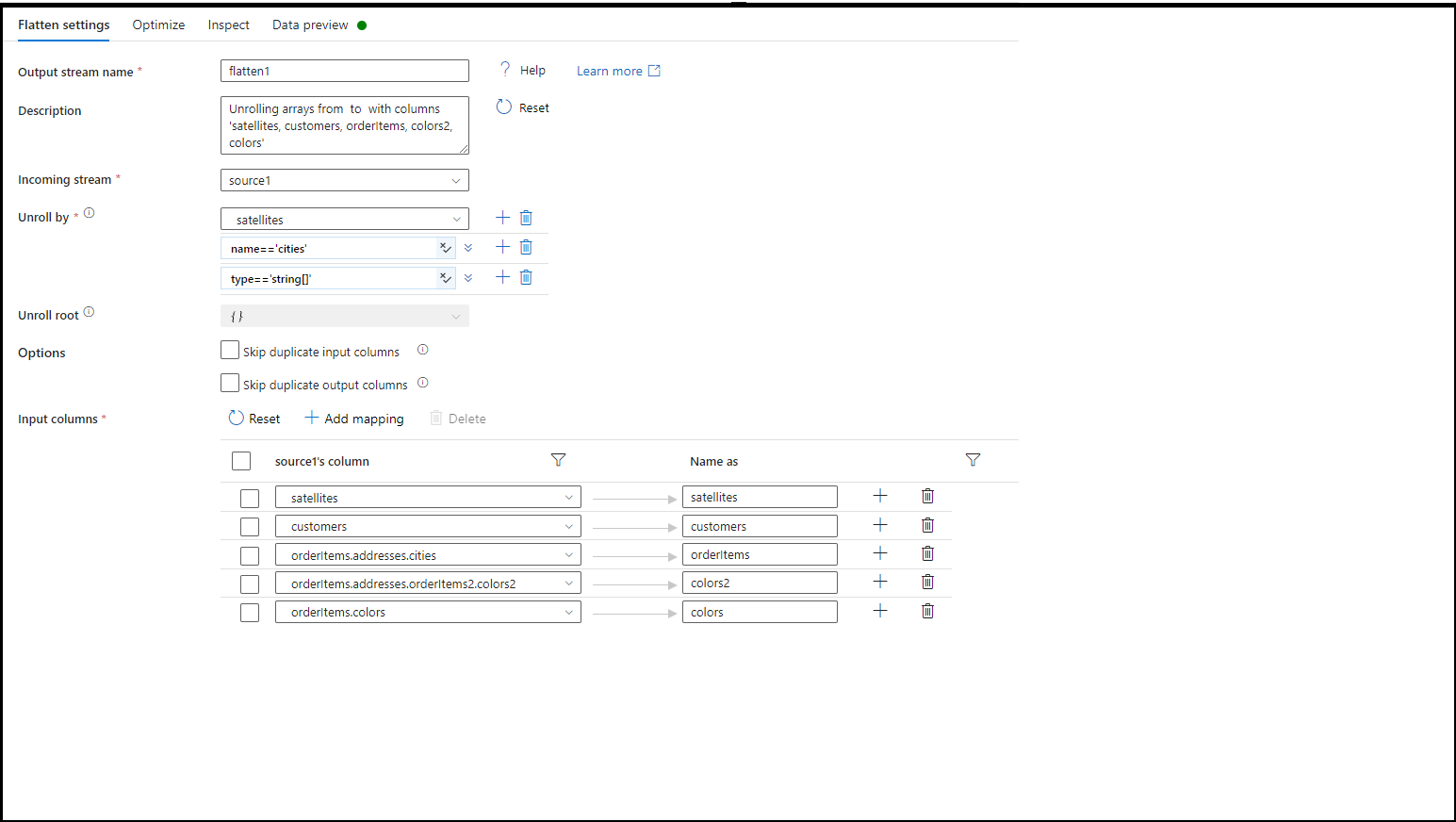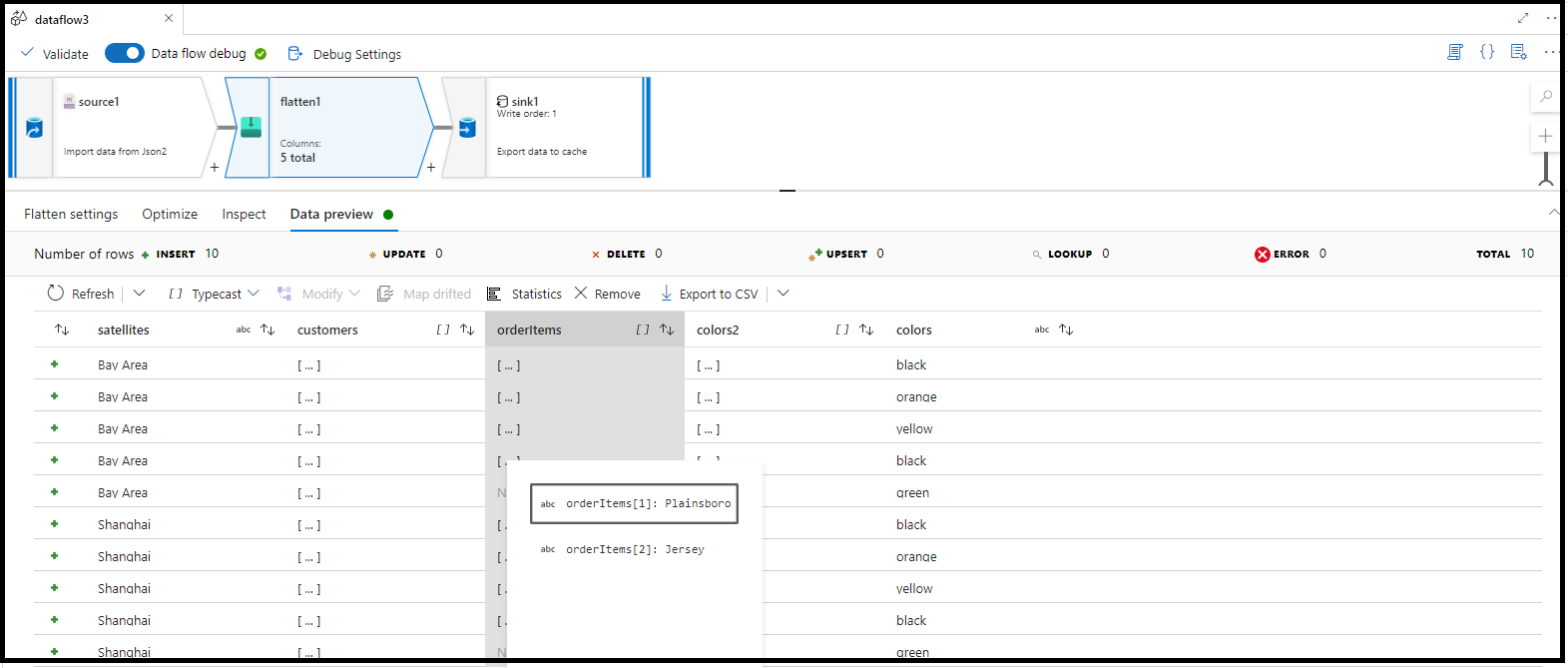Note
Access to this page requires authorization. You can try signing in or changing directories.
Access to this page requires authorization. You can try changing directories.
APPLIES TO:  Azure Data Factory
Azure Data Factory  Azure Synapse Analytics
Azure Synapse Analytics
Tip
Try out Data Factory in Microsoft Fabric, an all-in-one analytics solution for enterprises. Microsoft Fabric covers everything from data movement to data science, real-time analytics, business intelligence, and reporting. Learn how to start a new trial for free!
Data flows are available in both Azure Data Factory pipelines and Azure Synapse Analytics pipelines. This article applies to mapping data flows. If you're new to transformations, refer to the introductory article Transform data using mapping data flows.
Use the flatten transformation to take array values inside hierarchical structures such as JSON and unroll them into individual rows. This process is known as denormalization.
Configuration
The flatten transformation contains the following configuration settings.
Unroll by
Select an array to unroll. The output data will have one row per item in each array. If the unroll by array in the input row is null or empty, there will be one output row with unrolled values as null. You have the option to unroll more than one array per Flatten transformation. Click on the plus (+) button to include multiple arrays in a single Flatten transformation. You can use ADF data flow meta functions here including name and type and use pattern matching to unroll arrays that match those criteria. When including multiple arrays in a single Flatten transformation, your results will be a cartesian product of all of the possible array values.
Unroll root
By default, the flatten transformation unrolls an array to the top of the hierarchy it exists in. You can optionally select an array as your unroll root. The unroll root must be an array of complex objects that either is or contains the unroll by array. If an unroll root is selected, the output data will contain at least one row per items in the unroll root. If the input row doesn't have any items in the unroll root, it will be dropped from the output data. Choosing an unroll root will always output a less than or equal number of rows than the default behavior.
Flatten mapping
Similar to the select transformation, choose the projection of the new structure from incoming fields and the denormalized array. If a denormalized array is mapped, the output column will be the same data type as the array. If the unroll by array is an array of complex objects that contains subarrays, mapping an item of that subarry will output an array.
Refer to the inspect tab and data preview to verify your mapping output.
Rule-based mapping
The flatten transformation supports rule-based mapping allowing you to create dynamic and flexible transformations that will flatten arrays based on rules and flatten structures based on hierarchy levels.

Matching condition
Enter a pattern matching condition for the column or columns that you wish to flatten using either exact matching or patterns. Example: like(name,'cust%')
Deep column traversal
Optional setting that tells the service to handle all subcolumns of a complex object individually instead of handling the complex object as a whole column.
Hierarchy level
Choose the level of the hierarchy that you would like to expand.
Name matches (regex)
Optionally choose to express your name matching as a regular expression in this box, instead of using the matching condition above.
Examples
Refer to the following JSON object for the below examples of the flatten transformation
{
"name":"MSFT","location":"Redmond", "satellites": ["Bay Area", "Shanghai"],
"goods": {
"trade":true, "customers":["government", "distributer", "retail"],
"orders":[
{"orderId":1,"orderTotal":123.34,"shipped":{"orderItems":[{"itemName":"Laptop","itemQty":20},{"itemName":"Charger","itemQty":2}]}},
{"orderId":2,"orderTotal":323.34,"shipped":{"orderItems":[{"itemName":"Mice","itemQty":2},{"itemName":"Keyboard","itemQty":1}]}}
]}}
{"name":"Company1","location":"Seattle", "satellites": ["New York"],
"goods":{"trade":false, "customers":["store1", "store2"],
"orders":[
{"orderId":4,"orderTotal":123.34,"shipped":{"orderItems":[{"itemName":"Laptop","itemQty":20},{"itemName":"Charger","itemQty":3}]}},
{"orderId":5,"orderTotal":343.24,"shipped":{"orderItems":[{"itemName":"Chair","itemQty":4},{"itemName":"Lamp","itemQty":2}]}}
]}}
{"name": "Company2", "location": "Bellevue",
"goods": {"trade": true, "customers":["Bank"], "orders": [{"orderId": 4, "orderTotal": 123.34}]}}
{"name": "Company3", "location": "Kirkland"}
No unroll root with string array
| Unroll by | Unroll root | Projection |
|---|---|---|
| goods.customers | None | name customer = goods.customer |
Output
{ 'MSFT', 'government'}
{ 'MSFT', 'distributer'}
{ 'MSFT', 'retail'}
{ 'Company1', 'store'}
{ 'Company1', 'store2'}
{ 'Company2', 'Bank'}
{ 'Company3', null}
No unroll root with complex array
| Unroll by | Unroll root | Projection |
|---|---|---|
| goods.orders.shipped.orderItems | None | name orderId = goods.orders.orderId itemName = goods.orders.shipped.orderItems.itemName itemQty = goods.orders.shipped.orderItems.itemQty location = location |
Output
{ 'MSFT', 1, 'Laptop', 20, 'Redmond'}
{ 'MSFT', 1, 'Charger', 2, 'Redmond'}
{ 'MSFT', 2, 'Mice', 2, 'Redmond'}
{ 'MSFT', 2, 'Keyboard', 1, 'Redmond'}
{ 'Company1', 4, 'Laptop', 20, 'Seattle'}
{ 'Company1', 4, 'Charger', 3, 'Seattle'}
{ 'Company1', 5, 'Chair', 4, 'Seattle'}
{ 'Company1', 5, 'Lamp', 2, 'Seattle'}
{ 'Company2', 4, null, null, 'Bellevue'}
{ 'Company3', null, null, null, 'Kirkland'}
Same root as unroll array
| Unroll by | Unroll root | Projection |
|---|---|---|
| goods.orders | goods.orders | name goods.orders.shipped.orderItems.itemName goods.customers location |
Output
{ 'MSFT', ['Laptop','Charger'], ['government','distributer','retail'], 'Redmond'}
{ 'MSFT', ['Mice', 'Keyboard'], ['government','distributer','retail'], 'Redmond'}
{ 'Company1', ['Laptop','Charger'], ['store', 'store2'], 'Seattle'}
{ 'Company1', ['Chair', 'Lamp'], ['store', 'store2'], 'Seattle'}
{ 'Company2', null, ['Bank'], 'Bellevue'}
Unroll root with complex array
| Unroll by | Unroll root | Projection |
|---|---|---|
| goods.orders.shipped.orderItem | goods.orders | name orderId = goods.orders.orderId itemName = goods.orders.shipped.orderItems.itemName itemQty = goods.orders.shipped.orderItems.itemQty location = location |
Output
{ 'MSFT', 1, 'Laptop', 20, 'Redmond'}
{ 'MSFT', 1, 'Charger', 2, 'Redmond'}
{ 'MSFT', 2, 'Mice', 2, 'Redmond'}
{ 'MSFT', 2, 'Keyboard', 1, 'Redmond'}
{ 'Company1', 4, 'Laptop', 20, 'Seattle'}
{ 'Company1', 4, 'Charger', 3, 'Seattle'}
{ 'Company1', 5, 'Chair', 4, 'Seattle'}
{ 'Company1', 5, 'Lamp', 2, 'Seattle'}
{ 'Company2', 4, null, null, 'Bellevue'}
Data flow script
Syntax
<incomingStream>
foldDown(unroll(<unroll cols>),
mapColumn(
name,
each(<array>(type == '<arrayDataType>')),
each(<array>, match(true())),
location
)) ~> <transformationName>
Example
source foldDown(unroll(goods.orders.shipped.orderItems, goods.orders),
mapColumn(
name,
orderId = goods.orders.orderId,
itemName = goods.orders.shipped.orderItems.itemName,
itemQty = goods.orders.shipped.orderItems.itemQty,
location = location
),
skipDuplicateMapInputs: false,
skipDuplicateMapOutputs: false)
Related content
- Use the Pivot transformation to pivot rows to columns.
- Use the Unpivot transformation to pivot columns to rows.

